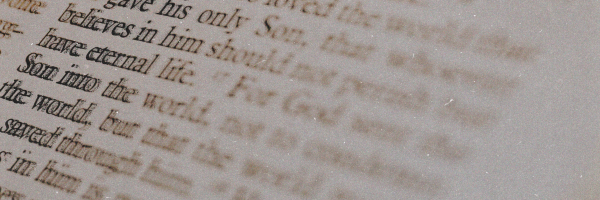HOW CAN I KNOW CHRISTIANITY IS TRUE?
HOW CAN I KNOW CHRISTIANITY IS TRUE?
Here are four reasons we can know that Christianity is true.
1. SCIENCE
Many atheists like to pit Christianity against science. But in fact, scientific findings in cosmology, biology, physics, and related disciplines strongly point to the likelihood of a supernatural designer. Here are a few of them:
THE ORIGIN OF THE UNIVERSE - Most scientists used to believe that the universe had always existed and had not changed in any major way, which they called a ‘steady state’ universe. This claim was made because they acknowledged that something cannot come from nothing. But with the rise of the Big Bang theory, it is now accepted that the universe had a beginning. And because they were right that anything which begins to exist cannot come out of nothing, there needs to be a Creator with both the power and the wisdom to make everything, and do so with such complex, beautiful design.
THE APPEARANCE OF LIFE - There is a huge problem in the theory of evolution when it comes to how life began. The claim is that the earth initially began as a ball of molten rock, which then cooled and formed an atmosphere. This produced rain, which rained on the rocks for billions of years, forming a sludge known as the ‘primordial soup’. And at some point, spontaneously, single-celled life forms came into existence in this soup. This process of getting life from non-life is known to evolutionary theorists as ‘abiogenesis’. The problem with this is that this process has never been observed, tested or replicated in any form. Even with perfect laboratory conditions running thousands of experiments, we humans have never produced life from non-life. How much less likely is it that this extraordinarily complex thing we call ‘life’ could just happen by chance? And how much more likely does that make it that there was a creator behind it all who could make life?
THE COMPLEXITY OF THE WORLD - For the universe to exist in a way that is stable and supports life, values such as the force of gravity, electromagnetic force, and the subatomic “weak force” need to be exactly as they are. Even if they were off by one part in 10100 (that’s 10 with 100 zeros after it) we would not have a universe that could produce life. And the thing is, these values could be totally different. But, they are not. They are so precise that a designer who understands what they need to be and made them that way is the only reasonable explanation.
Learn more about the scientific evidence for God’s existence in our article: DOES BEING A CHRISTIAN MEAN I DON'T BELIEVE IN SCIENCE?
2. MORALITY
Everyone operates with the basic understanding that some behaviors are right and others are wrong. That is not to say we always agree about what is right or wrong, but that some things are right and some are wrong is never in dispute. And we live this out in every single area of life, whether in the realm of politics, the family, or business, this idea of a moral standard is something humans are born with and cannot live without. Without a universal moral law, we would be unable to condemn the actions of others, such as stealing and murder. The best we could say is that we would prefer for people to not act that way. We can act in ways we think and hope are good, but we have no authority to appeal to as to why our particular understanding of morality is the right one.
And yet we do this all the time.
For a rule to be universal, it has to be true everywhere, all the time, and for everyone, no matter what they think about it. So, a universal moral rule–while it can be something that groups could slowly discover at different times–can’t just come from one group of people. It must be based on something more than just what that group likes.
And because we all agree that universal moral rules exist, the question becomes: where did they come from? A moral law needs to have someone in authority who can define the law, and with the power to enforce it. Someone who is both all good, and all powerful. That is God. Without God we cannot have the universal moral rules we seek to live by.
3. INTUITION
Though a number of people in the Western world claim that they don’t need a god, the fact is that for almost all of human history, the knowledge that there is some kind of god is as obvious as knowing that the sky is blue. This is what philosophers would describe as a “properly basic belief,” a belief that people can know is true simply through their own experience.
Even today, with all of our scientific and philosophical advancements, this remains true. Many people who are agnostic about the existence of any particular god still prefer to describe themselves as “spiritual.” Meanwhile atheism, which many predicted would take over as the dominant religious philosophy in America, has plateaued at just 6% of the US population, and confident belief in God is experiencing a huge rise in the United Kingdom.
CS Lewis famously argued that the desire that so many people naturally feel for another world (by which he meant heaven) is a strong indicator that another world actually exists. After all, the natural “hungers” that humans feel, such as for food or sex, all point to real things, so why not their hunger for heaven? (Read more)
It seems like humans simply cannot live with the idea that there is no God–at least not in any significant number. And the Bible backs this up, saying:
“For what can be known about God is plain to them (all people), because God has shown it to them. For his invisible attributes, namely, his eternal power and divine nature, have been clearly perceived, ever since the creation of the world, in the things that have been made. So they are without excuse” (Romans 1:20).
4. RESURRECTION
Many atheists dismiss claims about the resurrection of Jesus, saying, “We know that humans don’t rise from the dead.” And Christians agree; humans don’t rise from the dead. That’s why we consider this the greatest miracle in human history, and not just another Sunday morning.
But we have good reasons to believe that the resurrection is a historical event. Did you know, for instance, that Jesus’ enemies who put Him to death agreed that He had died, been placed in a tomb, and that the tomb was empty three days later? Did you know that His followers, rather than getting rich and powerful from the claim that He had risen, suffered and died for it, and yet never changed their tune? In our article, “Did Jesus really rise from the dead?”, we discuss four facts that are agreed upon by virtually all scholars regarding the death of Jesus and its immediate aftermath, and then show how no other theory than a real resurrection has been able to explain these facts.
5. CONCLUSION
This brief list of reasons is only scratching the surface of why we can be confident that Christianity is true. Keep looking around the site for more evidence and arguments.
Here are four reasons we can know that Christianity is true.
1. SCIENCE.
Many atheists like to pit Christianity against science. But in fact, scientific findings in cosmology, biology, physics, and related disciplines strongly point to the likelihood of a supernatural designer. Here are a few of them:
THE ORIGIN OF THE UNIVERSE - Most scientists used to believe that the universe had always existed and had not changed in any major way, which they called a ‘steady state’ universe. This claim was made because they acknowledged that something cannot come from nothing. But with the rise of the Big Bang theory, it is now accepted that the universe had a beginning. And because they were right that anything which begins to exist cannot come out of nothing, there needs to be a Creator with both the power and the wisdom to make everything, and do so with such complex, beautiful design.
THE APPEARANCE OF LIFE - There is a huge problem in the theory of evolution when it comes to how life began. The claim is that the earth initially began as a ball of molten rock, which then cooled and formed an atmosphere. This produced rain, which rained on the rocks for billions of years, forming a sludge known as the ‘primordial soup’. And at some point, spontaneously, single-celled life forms came into existence in this soup. This process of getting life from non-life is known to evolutionary theorists as ‘abiogenesis’. The problem with this is that this process has never been observed, tested or replicated in any form. Even with perfect laboratory conditions running thousands of experiments, we humans have never produced life from non-life. How much less likely is it that this extraordinarily complex thing we call ‘life’ could just happen by chance? And how much more likely does that make it that there was a creator behind it all who could make life?
THE COMPLEXITY OF THE WORLD - For the universe to exist in a way that is stable and supports life, values such as the force of gravity, electromagnetic force, and the subatomic “weak force” need to be exactly as they are. Even if they were off by one part in 10100 (that’s 10 with 100 zeros after it) we would not have a universe that could produce life. And the thing is, these values could be totally different. But, they are not. They are so precise that a designer who understands what they need to be and made them that way is the only reasonable explanation.
Learn more about the scientific evidence for God’s existence in our article: DOES BEING A CHRISTIAN MEAN I DON'T BELIEVE IN SCIENCE?
2. MORALITY.
Everyone operates with the basic understanding that some behaviors are right and others are wrong. That is not to say we always agree about what is right or wrong, but that some things are right and some are wrong is never in dispute. And we live this out in every single area of life, whether in the realm of politics, the family, or business, this idea of a moral standard is something humans are born with and cannot live without. Without a universal moral law, we would be unable to condemn the actions of others, such as stealing and murder. The best we could say is that we would prefer for people to not act that way. We can act in ways we think and hope are good, but we have no authority to appeal to as to why our particular understanding of morality is the right one.
And yet we do this all the time.
For a rule to be universal, it has to be true everywhere, all the time, and for everyone, no matter what they think about it. So, a universal moral rule–while it can be something that groups could slowly discover at different times–can’t just come from one group of people. It must be based on something more than just what that group likes.
And because we all agree that universal moral rules exist, the question becomes: where did they come from? A moral law needs to have someone in authority who can define the law, and with the power to enforce it. Someone who is both all good, and all powerful. That is God. Without God we cannot have the universal moral rules we seek to live by.
2. INTUITION.
Though a number of people in the Western world claim that they don’t need a god, the fact is that for almost all of human history, the knowledge that there is some kind of god is as obvious as knowing that the sky is blue. This is what philosophers would describe as a “properly basic belief,” a belief that people can know is true simply through their own experience.
Even today, with all of our scientific and philosophical advancements, this remains true. Many people who are agnostic about the existence of any particular god still prefer to describe themselves as “spiritual.” Meanwhile atheism, which many predicted would take over as the dominant religious philosophy in America, has plateaued at just 6% of the US population, and confident belief in God is experiencing a huge rise in the United Kingdom.
CS Lewis famously argued that the desire that so many people naturally feel for another world (by which he meant heaven) is a strong indicator that another world actually exists. After all, the natural “hungers” that humans feel, such as for food or sex, all point to real things, so why not their hunger for heaven? (Read more)
It seems like humans simply cannot live with the idea that there is no God–at least not in any significant number. And the Bible backs this up, saying:
“For what can be known about God is plain to them (all people), because God has shown it to them. For his invisible attributes, namely, his eternal power and divine nature, have been clearly perceived, ever since the creation of the world, in the things that have been made. So they are without excuse” (Romans 1:20).
4. RESURRECTION.
Many atheists dismiss claims about the resurrection of Jesus, saying, “We know that humans don’t rise from the dead.” And Christians agree; humans don’t rise from the dead. That’s why we consider this the greatest miracle in human history, and not just another Sunday morning.
But we have good reasons to believe that the resurrection is a historical event. Did you know, for instance, that Jesus’ enemies who put Him to death agreed that He had died, been placed in a tomb, and that the tomb was empty three days later? Did you know that His followers, rather than getting rich and powerful from the claim that He had risen, suffered and died for it, and yet never changed their tune? In our article, “Did Jesus really rise from the dead?”, we discuss four facts that are agreed upon by virtually all scholars regarding the death of Jesus and its immediate aftermath, and then show how no other theory than a real resurrection has been able to explain these facts.
5. CONCLUSION.
This brief list of reasons is only scratching the surface of why we can be confident that Christianity is true. Keep looking around the site for more evidence and arguments.








